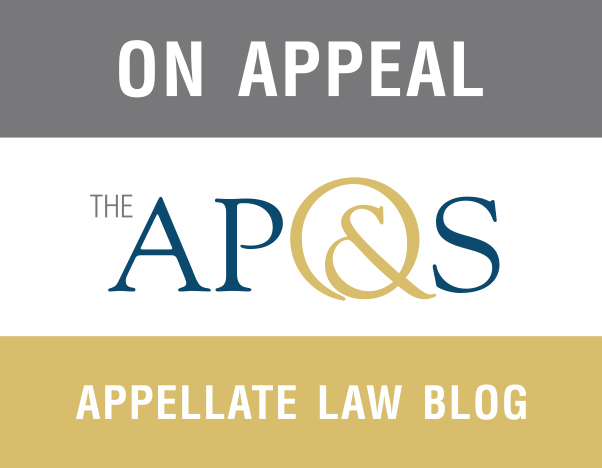Among the many programs offered at this year’s Rhode Island Bar Association Annual Meeting was a continuing legal education program titled “Dos and Don’ts of Appellate Practice.” The panel, moderated by my colleague, John Tarantino, 2012-2013 chair of the Rhode Island Supreme Court Bench/Bar Committee, featured Rhode Island Supreme Court Chief Justice Suttell and Justices Goldberg and Indeglia. This edition of the Fast Five details some of the salient points made and advice given by the panelists.
(1) USE OF DEMONSTRATIVES DURING ORAL ARGUMENT MAY BE APPROPRIATE IN CERTAIN CASES.
The April 2013 edition of the Fast Five on Rhode Island Appellate Practice noted that in two decisions this term, the Rhode Island Supreme Court appended to its decisions illustrations to help explain the basis for its decisions. See DeMaio v. Ciccone, No. 2011-211-Appeal (R.I. Feb. 1, 2013); Rhode Island Mobile Sportfishermen, Inc. v. Nope’s Island Conservation Association, Inc., No. 2011-180-Appeal (R.I. Jan. 31, 2013).
During the Rhode Island Bar Association’s Annual Meeting, three justices of the Rhode Island Supreme Court indicated that demonstratives may be appropriate and useful during oral argument in particular cases. Examples of demonstratives that the Court has found helpful include charts and plat maps demonstrating the location of a right of way.
The justices advised practitioners to ensure that their demonstratives are legible and to advise the Court Clerk of their intention to use demonstratives. In complex cases, practitioners may need to seek an advanced ruling from the Court giving them permission to utilize demonstratives.
(2) WRITE BETTER BRIEFS: READ HEMINGWAY.
During the Bar Association’s Annual Meeting, Chief Justice Suttell offered advice to appellate practitioners looking to improve their brief writing.
He advised that practitioners should strive to present the facts in an interesting (but not cute) way. His recommendation on how to do that: read Hemingway’s short stories to put you in the right frame of mind.
(3) A WORD ABOUT APPENDICES.
Appendices are governed by Rule 17 of the Rhode Island Supreme Court Rules of Appellate Procedure. In her comments during the Annual Meeting, Justice Goldberg advised practitioners to submit well organized appendices to the Court and, in accordance with Rule 17, such appendices should include a table of contents. In addition, where appropriate, appendices submitted to the Court should be divided into multiple volumes to avoid the submission of oversized and heavy appendices.
(4) DON’T FIGHT FIRE WITH FIRE.
In their comments at the Annual Meeting, three justices of the Rhode Island Supreme Court cautioned practitioners about ad hominem in briefs. Personal attacks have no place in appellate briefs. Practitioners who receive briefs from opposing counsel with ad hominem should refrain from responding in kind and, in some instances, the Court may entertain a motion to strike ad hominem from a party’s brief.
(5) DON’T GO IT ALONE.
Among the advice that three Rhode Island Supreme Court justices offered to practitioners at the Rhode Island Bar Association’s Annual Meeting was that those who have never handled a case before the Rhode Island Supreme Court and those who appear before the Court infrequently should consider engaging an appellate practitioner to assist with their appeal.



